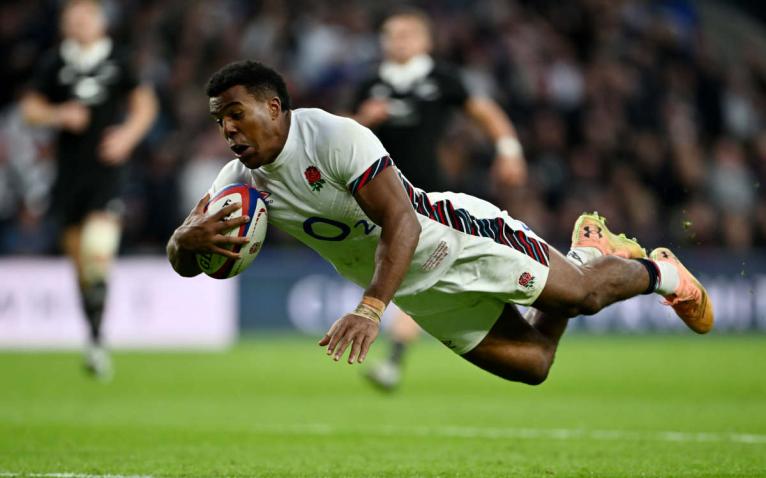
[ad_1]
Groundhog Day. Newly-named stadium, same old story. You can factor in all the fads and gimmicks and Haka-facing stunts that you like but there’s nothing that matters more than a stable scrum, a fly-half that has been on point in all that he has done, to get you across the line. England have been worthy losers too often for comfort, gutsy and valiant and, yes, at times, clever and tricky, but the scoreboard does not lie. They are second best when it comes to the crunch. Of course, the margins are small. Of course there was heaps to admire in this battling, nerve-shredding loss.
However, when Steve Borthwick and his coaching cohorts speak of marginal gains, preach the gospel of small big things, of decisions of consequence, then you get to the nub of the matter when you wonder as to why you would take off Marcus Smith and replace him with George Ford, a lacking match-sharpness Geroge Ford at that. It looked for all the world like a pre-game, pre-planned strategy, one of those theories – let Marcus sprinkle his magic for an hour and then get measured George to manage the game in the final quarter – that looks fine on paper and complete cobblers on the pitch.
Ford, of course, is no mug. Far from it. He is one of the most under-appreciated fly-halves of the last decade, forever in the shadow of Owen Farrell, yet a player who invariably delivered. Think Argentina in the World Cup for recent starters. Ford has plenty of successful clutch-moment plays on his CV. Until Saturday. Until he went too high in the tackle and was shrugged off by try-scoring wing, Mark Tale’a. Until his long-range penalty hit the post. Until his potential match-winning drop-goal skewed off-target.
George Ford has dug England out of many holes but the gamble to introduce him after a period out injured backfired (Photo Michael Steele/Getty Images)
We shouldn’t pick too many holes in Ford’s game. But we should pick holes in Borthwick’s substitution (as well as a pressurised scrum, Harry Randall’s ballooning, off-key pass and the absence of any guard for Ford). It is too simplistic to say that England are building and that they will inevitably turn these narrow losses into victories. It doesn’t just happen. There are no guarantees in elite sport. This was England’s fifth defeat of the year. For all the promise, for all the uplift, for all the ambition and intent, England’s 2024 record is not the stuff of champions.
And those whose memory was seduced by the sight of the 2003 World Cup-winning side doing a lap of honour at half-time into believing that all those Grand Slam near-misses was eventually good training for the real thing in Australia and will surely apply to Borthwick’s team, the fact of the matter is that Clive Woodward’s men might have cocked up their Six Nations’ finale on three occasions but they were also beating the southern hemisphere Big Three routinely across that same period.
Smith’s goal-kicking, which has been an issue in Dunedin in the summer, was spot-on, very much in the mould of Jonny Wilkinson in that he kept the scoreboard ticking over.
As his players need to grow so too does the England head coach. He needs to have faith in Marcus Smith for a start. The Harlequin is lazily characterised as a maverick, capable of acts of daring and imagination but not to be trusted when it comes to the squeaky-bum game management stuff. How many times was Dan Carter ever substituted? Or Johnny Sexton? This should be a pivotal moment for Borthwick and Marcus Smith. Back him to go all the way.
There was certainly enough in Smith’s play, including a no-shirking, head-on tackle on the game’s star turn, New Zealand flanker, Wallace Sititi, to indicate that his ‘apprenticeship,’ is well and truly over. Smith’s goal-kicking, which has been an issue in Dunedin in the summer, was spot-on, very much in the mould of Jonny Wilkinson in that he kept the scoreboard ticking over when there was a danger that the All Blacks would feed off the energy that their greater strike-power gave them (three tries to one tells its own tale) and coast clear.
A try for the ages 💥
Immanuel Feyi-Waboso crosses for England as they nudge ahead at Allianz Stadium.
Watch the second half live now on @rugbyontnt 👇
— England Rugby (@EnglandRugby) November 2, 2024
Replacements are a blight rather than a boon on so many levels. And, for certain, they enable coaches to meddle too much. Just because there is a sub doesn’t mean that you have to use them no matter what your hours of pre-match analysis and data show. At the final whistle, with the sighs of deflated England fans echoing round the stadium, there was a TV shot of Borthwick looking at his laptop up in the stands as if only technology might provide an answer. Steve, ditch the tech. Trust your gut. You won’t go far wrong.
That was the key point of difference. There were scrum issues in the later stages that England need to address but at least they know that they have a youthful cavalry coming over the horizon to shore up any fault lines. Perhaps England dodged a bullet with Ethan de Groot’s unavailability for disciplinary reasons but even so there was a commendable solidity about England’s scrum for that opening hour of play.
There are defensive issues for new man, Joe El-Abd, to work on although, for the most part, England’s blitz had the desired effect in unsettling the All Blacks.
That bodes well. As do so many other facts of England’s game. But to take solace in the many upsides of their performance would be wrong. It is the refuge of losers. England need to be hyper-critical. And there is every sign that they will be. They have a lot to build on. Maro Itoje led the way in the forward pack, all-consuming in a back five that yielded little to their opposite numbers. Well, apart from the once-in-a-lifetime talent that is Sititi. If Borthwick needed any encouragement to blood the likes of Northampton back-rower, Henry Pollock, then Sititi’s development is a bona fide point of reassurance.
Maybe that is for another day. For the here and now, Borthwick has little reason to change his course of action, his own substitution policy notwithstanding. There are defensive issues for new man, Joe El-Abd, to work on although, for the most part, England’s blitz had the desired effect in unsettling the All Blacks. Even so, there has to be concern at the manner in which it was prop, Ellis Genge, that was left isolated and picked off. The All Blacks are masters of exploiting space and openings. England can progress defensively from here.
 In Immanuel Feyi-Waboso, England have a generational talent (Photo by Dan Mullan/Getty Images)
In Immanuel Feyi-Waboso, England have a generational talent (Photo by Dan Mullan/Getty Images)
They weren’t, however, able to generate as many attacking plays as they might have wished although Manny Feyi-Waboso was, once again, a real handful.
The Australia game now assumes a frightening level of intensity and scrutiny. Brilliant. That’s exactly what this England generation needs. What Borthwick needs, too.
There was plenty to appreciate on a rousing afternoon at the Allianz-minted old cabbage patch. The new law emphasis on penalising any blockers on the catchers was a success as was the ref mic to explain key decisions to the crowd who would surely have enjoyed the day but for the result. Perhaps a win might have camouflaged a few deficiencies. England now have little autumnal wriggle room left. And that should fire them up just fine.
[ad_2]
Copyright for syndicated content belongs to the linked Source link


